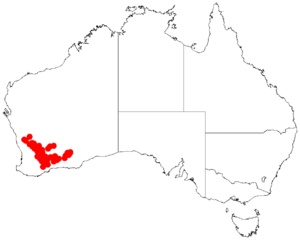Acacia dissona facts for kids
Quick facts for kids Acacia dissona |
|
|---|---|
| Scientific classification | |
| Genus: |
Acacia
|
| Species: |
dissona
|
 |
|
| Occurrence data from AVH | |
Acacia dissona is a shrub of the genus Acacia and the subgenus Plurinerves that is endemic to an area of south western Australia.
Description
The shrub typically grows to a height of 0.5 to 2 metres (2 to 7 ft) and usually has contorted branches with ridges hairy branchlets. Like most species of Acacia it has phyllodes rather than true leaves. The evergreen, inclined to erect phyllodes are quite straight with a length of 2 to 4 cm (0.79 to 1.57 in) and a width of 1 to 1.5 mm (0.039 to 0.059 in) and narrow abruptly to a pungent and rigid tip. It blooms from July to October and produces yellow flowers. The simple inflorescences are found in pairs in the axils and have spherical flower-heads with a diameter of 5 to 6 mm (0.20 to 0.24 in) and contain 15 to 20 golden coloured flowers. Following flowering it produces linear seed pods that are raised over and constricted between each of the seeds. The thinly-crustaceous to thinly-coriaceous pods are moderately curved with a length of up to about 6 cm (2.4 in) and a width of around 2.5 mm (0.098 in). The glossy dark-brown seeds have an oblong-elliptic shape with of around 2.5 to 4.5 mm (0.098 to 0.177 in) and a width of around 1.5 mm (0.059 in).
Taxonomy
The species was first formally described by the botanists Richard Sumner Cowan and Bruce Maslin in 1995 as a part of the work Acacia Miscellany. Five groups of microneurous species of Acacia (Leguminosae: Mimosoideae: section Plurinerves), mostly from Western Australia as published in the journal Nuytsia. There are two recognised varieties:
- Acacia dissona var. dissona
- Acacia dissona var. indoloria
Distribution
It is native to an area in the Wheatbelt and Goldfields-Esperance regions of Western Australia where it is commonly situated on undulating plains growing in sandy, clay or loamy soils. It has a discontinuous and scattered distribution from Coorow in the north west to Ongerup in the south west to Southern Cross in the north east and Norseman in the south east.

